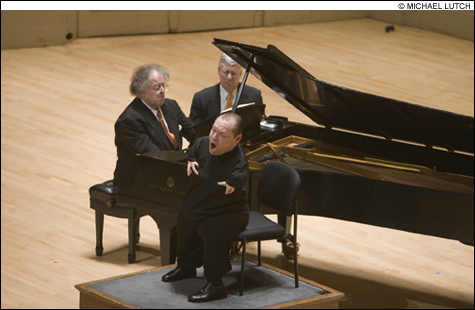
WINTERREISE: Thomas Quasthoff and James Levine were in their element. |
One sign of Boston’s rich classical-music scene is that there are often hard choices to make when two outstanding events are scheduled at the same time. I can’t remember a worse conflict than the one at 3 pm last Sunday. At Symphony Hall, James Levine was accompanying bass-baritone Thomas Quasthoff, one of the world’s greatest living lieder singers, in the greatest song cycle ever written, Schubert’s Winterreise (“Winter Journey”). At Jordan Hall, Donald Teeters was celebrating his 40th anniversary leading the Boston Cecilia, which must have played more Handel operas than any other group in town, with a spectacular line-up of veteran and up-and-coming Handel singers in the Handel bash to end all Handel bashes — an endless stream of some of the most gorgeous arias and choruses ever written. Impossible. Since Winterreise is shorter, I opted to hear it whole then rush across the street to Cecilia. I wasn’t disappointed by either one.
One of countless extraordinary moments comes in the second song of Winterreise, “Die Wetterfahne” (“The Weathervane”). “Inside, the wind plays with hearts,” the singer laments over the faithlessness of his beloved, “just as it does on the roof — only not so loud.” Quasthoff and Levine took a long pause and Quasthoff sang the last part, “nur nicht so laut,” almost in a whisper, as if in awe of the mystery of the human heart and its ruthless, unpredictable changeability. I’ve seldom heard performers make so much of this moment. But it was not a gimmick. It felt completely natural and lived through. Even in cavernous Symphony Hall, I was drawn into one of music’s most intimate experiences.
Quasthoff was in his element. His voice has deepened and darkened, and his beautiful tone filled out every phrase, loud and soft, high and, especially, low. Levine gave one of his most sensitive, understated, eloquent performances. They made particularly striking the several songs in which there are abrupt switches between a twinkling fantasy of hope (a dream of springtime, the arrival of a letter) and the stark, hopeless actuality. The loud explosions after Quasthoff’s held-back, trancelike singing always sounded like escaping cries of woe.
In this late work, Schubert explores questions of existence: of God and pain. “Mut!” (“Courage!”) is a hearty drinking song that ends, “If there is no God on earth,/Then we ourselves are gods.” But this is not the answer to the question “Why, if I have done no wrong,/Should I shun mankind?” Quasthoff sounded almost hypnotized by the “signpost” that pointed him on his endless journey from which no one returns, just as he seemed mesmerized by his vision of crows ceaselessly circling him.
The last song, “Der Leiermann,” is the most poignant and the most profound. The singer meets an old organ grinder, barefoot, playing his hurdy-gurdy beyond the village, his tray empty of coins, his only audience snarling dogs. Quasthoff pleaded to go with the old man, to have him turn his suffering into the organ grinder’s songs. What else can one do with suffering except turn it into art? The cycle is devastating. The performance was quietly devastating. Yet in its beauty and inwardness and human understanding, also exalting.